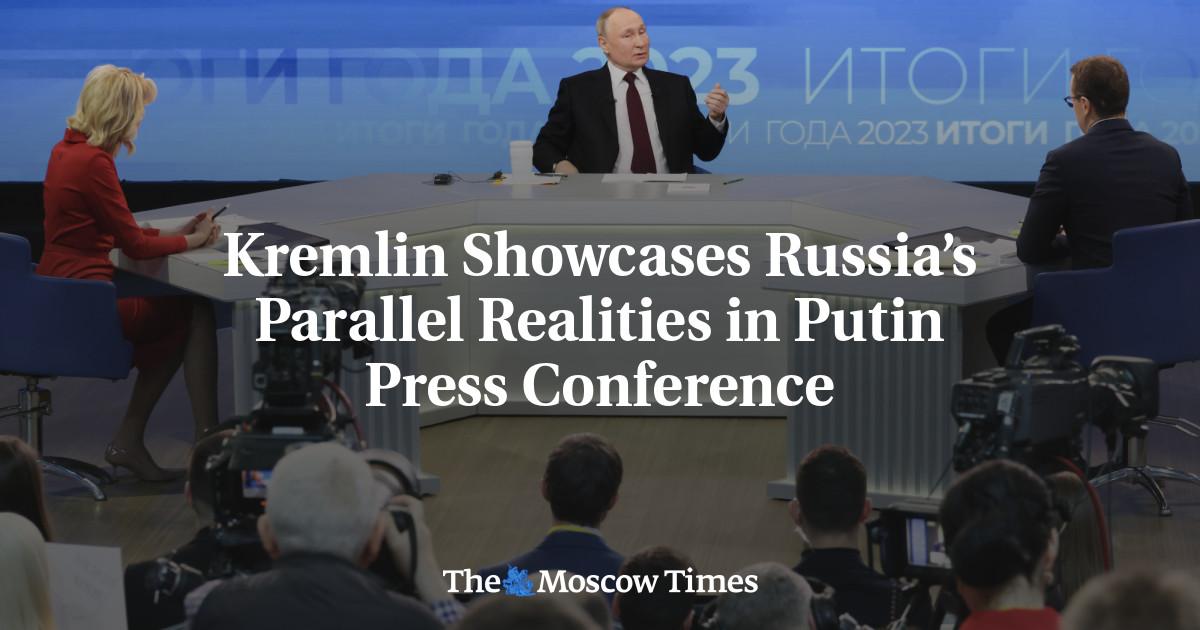
President Vladimir Putin sought to use his end-of-year press conference to convince Russians and the world that he is confident in himself, in the people’s favor and in Ukraine’s defeat as he kicks off his bid to run for a fifth term as president.
Yet during Thursday’s marathon event, Putin, 71, appeared to be going through the motions, feigning reactions and avoiding uncomfortable questions, highlighting the dissonance between the Kremlin’s reality and that of the rest of Russia.
In past years, many officials in the Kremlin, the government, and the regions would watch the televised press conference in real time.
But for Putin’s first press conference since sending troops into Ukraine, as well as his first to be combined with the “Direct Line” call-in program, some could not bring themselves to sit in front of the television screen for the entire four hours.
“I didn’t even watch the chief’s speech today,” a government official told The Moscow Times, using a nickname for Putin often heard within the walls of the Russian government.
The official spoke on condition of anonymity as she is not authorized to give public comments to the press.
“I only heard a joke about chicken eggs [‘eggs’ is a double entendre for ‘testicles’ in Russian] from my colleagues in the hallway. And nothing else!” she said, referring to a question to Putin about the rising price of the staple food.
Two other Russian government officials told The Moscow Times that they did not watch the live broadcast but instead followed along through updates on the messaging app Telegram.
Both claimed they had watched Putin’s conference on television in past years.
An employee from the construction and housing ministry told The Moscow Times that he and some of his colleagues watched the president’s speech on TV in its entirety on Thursday.
“Our leader has really aged. And the format itself, where he rushes through figures and facts, is already overused. Personally, I didn’t hear anything new this time,” the employee said.
He spoke on condition of anonymity because he feared his comments could be seen as “discrediting” the authorities, which risks administrative or even criminal liability.
Putin himself has grown tired of his annual press conferences and “Direct Line” programs, two Kremlin officials have repeatedly told The Moscow Times over the past five years.
But because these events have become a tradition, Putin is stuck with them.
Last year, Putin canceled his annual press conference and the Federal Assembly address as he faced growing unrest over his “partial” mobilization order, the Russian military’s retreat from Kherson and Ukrainian drone attacks on military and civilian facilities inside Russia.
As a result, the Kremlin needed to make up for the embarrassments of 2022 and send a positive signal to Russians who expect Putin to run a short, fast-paced campaign as he seeks a fifth presidential term.
“That’s why they decided to make it a mandatory program: no less than four hours of Putin live on air in good news mode,” a source close to the Kremlin told The Moscow Times.
An insider from the ruling, pro-Kremlin United Russia party confirmed this.
Putin’s main task in the three months leading up to election day is to discuss only positive developments in the country and to inspire voters — all while brushing over any bad news. At Thursday’s event, he appeared uncomfortable in this role, repeating several times that he was not saying anything new.
All the questions, as usual, were staged in advance by the Kremlin.
“One of the most sensitive and undesirable topics is the protests of family members of mobilized soldiers who have been at the front for over a year without rotation,” the source close to the Kremlin said.
The sensitivity of this issue and the fact that the Kremlin still lacks a response to it was publicly confirmed Thursday by a pro-Kremlin propagandist.
Meanwhile, there was zero tolerance for questions on jailed Kremlin critic Alexei Navalny, Wagner leader Yevgeny Prigozhin’s mutiny and death in a plane crash, media censorship, or the persecution of anti-war figures, The Moscow Times learned from its sources.
Neither Navalny nor Prigozhin were brought up at Thursday’s press conference.
But to give the impression that there were no off-limits topics, the Kremlin brought back a tried-and-true method: several critical questions were displayed in large print on the studio’s digital screens as Putin spoke.
“It was purposely selected in advance, it was pre-moderated, and it was published in order to feed the Telegram channels and independent media,” a person familiar with the preparation of the press conference told The Moscow Times.
These questions “sort of existed [at the event], but the president didn’t say a word about them. It turned out to be two parallel realities.”
Putin’s ability to convey sincerity when addressing the daily issues of ordinary Russians has waned over his more than two decades in power, Rostislav Murzagulov, a former associate of Radiy Khabirov, the head of Russia’s republic of Bashkortostan, told The Moscow Times.
“Under Putin, a lot of things in Russia have turned into simulacra, just as [Jean] Baudrillard described it,” said Murzagulov, who is now in exile, referring to the French philosopher whose work explored the boundaries between reality and simulation.
“We saw one of them today.”